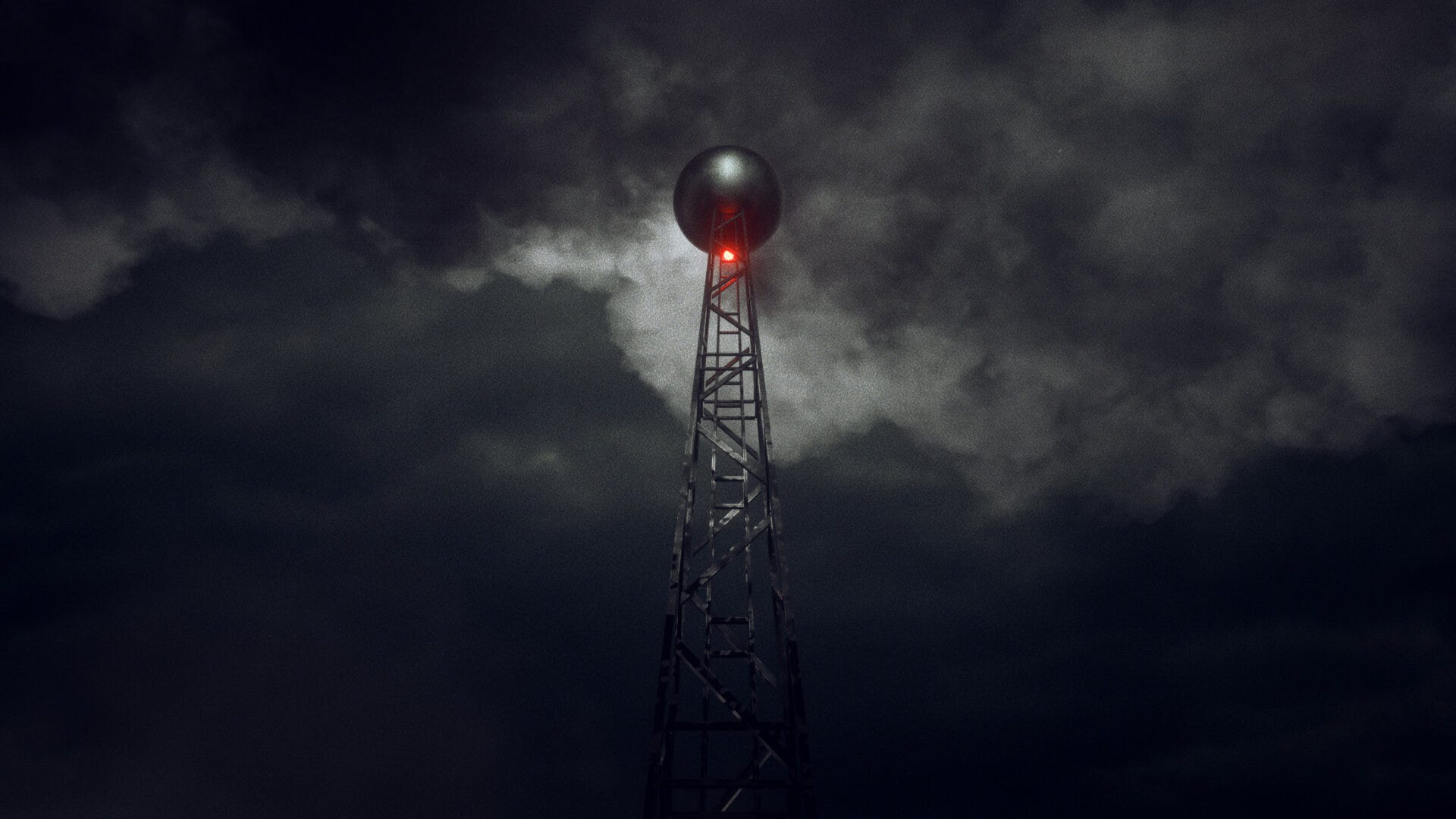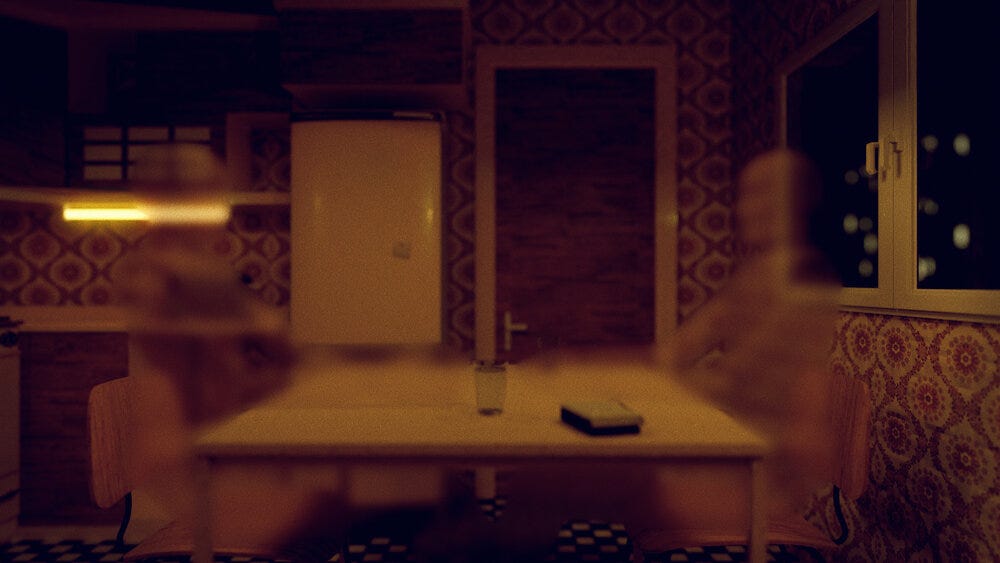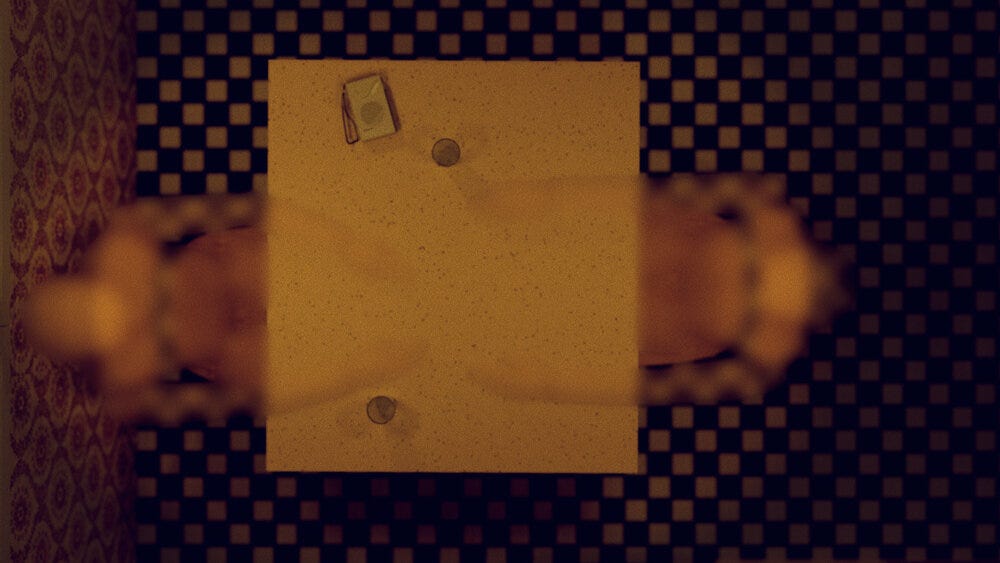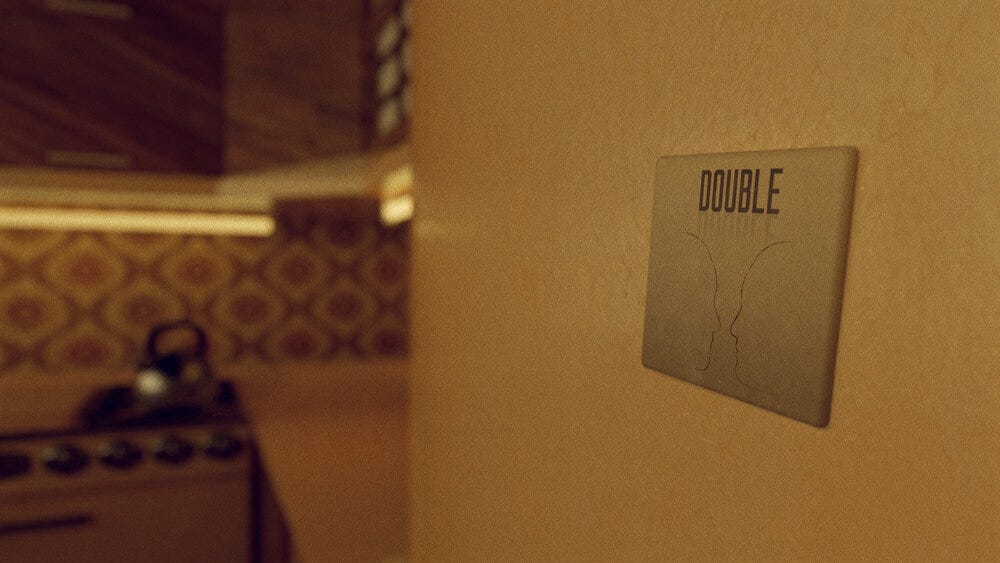
The countdown had started. We had seven hours to go. I turn from my phone to the show’s descriptive quote on my laptop. “Reality is just a hallucination that we can all agree on,” according to neuroscientist Anil Seth.
Seven hours later, settled at my kitchen table, I wait for the hallucinatory reality of DOUBLE.
DOUBLE, the first production by DARKFIELD RADIO (a new subset of DARKFIELD), is “a troubling exercise in familiarity for two people sitting opposite each other on either side of a kitchen table, replicated in hundreds of rooms all across the world.” The experience mines the Capgras delusion, a psychiatric disorder in which a person believes someone close to them has been replaced by an identical impostor, often with nefarious intent.
DARKFIELD is self-described as “an immersive multi-sensory sonic theme park.” Aurally-driven, psychologically-probing, immersive shows presented in the complete darkness of a shipping container are DARKFIELD’s signature. Past experiences include explorations into the parallel worlds of quantum mechanics, the tenuous character of superstitions, and the boundary blurring of collective dreaming.
(Major spoilers for this experience follow.)

Sitting at my kitchen table, opposite my partner, I watch the strobing seconds of the countdown. We look up from our phones simultaneously, each wearing headphones. And then she starts talking: a Siri-like voice embodying a recognizable dichotomy of computer-generated assistant and friendly radio host. “Cover your ears with DARKFIELD RADIO. No news. No music. No opinion.”
The Voice takes on a Samuel Beckett-like rhythm of repeated instructions and staccato declarations. Interwoven are radio tuning sound effects, a serving of muzak, and those reflexively familiar pinging email alerts. Assuming I’d forgotten to turn off my notifications, the Voice clarifies, “That was me.” I laugh outright.
The commands continue. My partner and I each procure a glass of water and sit back down, placing the glasses in front of us and to our right, as directed. “This may be recorded for evidence or just to prove a point. Look at the face in front of you, this person who you met however long ago. You are both, of course, who you say you are.” Facing a face I’ve been in lockdown with, one I’ve looked at countless times, we obediently sip our waters and then close our eyes.
Almost immediately, my partner becomes irretrievable to me. The Voice herds me through an unnerving meditation on the slippery nature of recall. In my mind’s eye, his features fog out of focus. The Voice asks questions about this person — the dissolving image I can’t reassemble — and then traverses into the pliability of language. “Say your partner’s name to yourself. Say it again and again. Say it again until it becomes just a word that describes something. An object.” My partner’s name volleys back and forth in my head. With each flight, the vowels stretch out and smear into one another.
My eyes still shut, echoes of those elastic vowels give way to a zipper sound and other new noises, ones without edges. Is that coming from outside my window or is that part of the recording? I wonder. A man’s voice cuts in, identifying objects in the room, in his kitchen, as more sounds surface: flies humming, a kettle hissing. “It’s impossible to look at everything all the time, so we don’t really look until we’re asked to,” the Man insists. And down the rabbit hole we go.
DOUBLE’s sound design is deliciously vivid and enveloping; the binaural audio pours out imagery and tactile sensations. Similar to Simon McBurney’s The Encounter, I so fully feel the whispers and breaths that my neck hairs vibrate and I flinch in response. I instinctively lower a hand next to my chair, reaching out for the pants leg of the Man who must be hovering over me.
In my mind, I see the Man’s kitchen, sense the distance between his table and the moaning kettle. The objects he catalogs, the way he moves around the room — I don’t just picture shapes, colors, and placement, I understand what has mass and witness the negative space in-between.
This world is so beautifully constructed it creates an expansive sensation. It feels like my mind’s eye pushes outward beyond my body, so that I find myself inside the Man’s kitchen with him, watching him talk and move about this imagined reality. Towards the end of the experience, the Man takes actions that change the aural landscape, contracting his world, and I feel myself receding from that space.
Get Laura Hess’s stories in your inbox
Join Medium for free to get updates from this writer.
SubscribeSubscribe
But then I ache with disappointment upon discovering… nothing. At the end of the 20-minute experience, I open my eyes, slide off the headphones, and survey my partner, the room, and our glasses of water. I wait for DOUBLE to “prove a point,” but nothing has changed, even subtly, to indicate that the world I return to may not be the same as before. In spite of its resonant, layered allegory, DOUBLE’s journey is a missed opportunity to capitalize on the show’s prescription: physical proximity to someone else.

As an immersive radio play, DOUBLE combines gorgeous production quality with the exploration of complex, relevant themes such as perception and the subjectivity of truth. But as an interactive experience, it fails to deliver on the duplicitous nature of its premise. Upon completion, there was no wondering if we had each participated in the same experience, no unnerving sensation that my partner may not be who I believe him to be or that he had intentions unknown to me. Why experience this together, if there’s no play on reality through this shared physical world? Ultimately, I wasn’t challenged to examine or unriddle those core questions in a personal way: What is real? What is illusion? And how can I be sure of the difference?
For each of their productions, DARKFIELD includes a provocative quotation, a beacon for the experience, posited by the likes of artist Leonardo da Vinci and writers Kurt Vonnegut and Robert G. Ingersoll. For DOUBLE, DARKFIELD turns to neuroscientist Anil Seth, who defines hallucination as “uncontrolled perception.” His statement “Reality is just a hallucination that we can all agree on,” is accompanied by the following text written by DARKFIELD:
There is only one rule: everyone has to be who they say they are.
Under certain circumstances even the most unshakable and reliable truths can unravel, and untangling all the loose ends and rolling everything back onto the spool is sometimes too much to bear.
So maybe we should exchange our ordinary illusions for other, wilder ones….

The world in which we now live in feels like a hallucination, at least in the United States. Time has contorted, fluctuating between incredible velocity and halted suspension. We’ve lost sight of which day it is, which month, even.
I write this in a darkened apartment due to power blackouts, while California is aflame, as we crumple out of bed day after day, mustering up ounces of motivation, even to create meme-bandaids that won’t stop the bleed, but just might make this hallucination feel more like perverse entertainment, a movie we’ve elected to watch, one that we can pause or fast-forward. We try to laugh through our tears, muttering, “You couldn’t write this,” as we add chalk marks to the prison walls of 2020: a global pandemic, economic devastation, civil unrest, murder hornets, fire tornadoes, dueling hurricanes, weapon-wielding usurpers enraged about bits of face-fabric, and the newly subversive, emotionally patriotic action of…buying stamps.
Many of our “most unshakable and reliable truths,” as DARKFIELD puts it, have indeed unraveled. We assumed the boundaries of our government would remain intact; we took for granted that democracy is guaranteed anywhere for any length of time. We thought the authority of science would prevail; we watched as the fence between verified evidence and personal opinion was blown apart. We’ve upended the “one rule” that “everyone has to be who they say they are”; the Internet and social media have long since obliterated that tenet.
For the most part, we are confined to the same, limited environment. It feels like we’ve been abandoned in a scientific experiment akin to an episode of Black Mirror; we’re perfectly primed for DOUBLE to level up on this shared moment, given our memory’s fragile state, our eviscerated emotions, and current hallucinatory conditions. Yet for all that it does right DOUBLE misses an opportunity to invert our sense of reality by torquing our trust in the material world: to look around, try to remember what was true, and then feel the warm rush of dread, the thick static of déjà vu, and consider the connotations.
Is this an uncontrolled perception or a controlled hallucination?
And what, truly, is the difference?
DOUBLE continues through September 10. Tickets are $7.50 per person.
NoPro is a labor of love made possible by our generous Patreon backers. Join them today!
In addition to the No Proscenium web site, our podcast, and our newsletters, you can find NoPro on Twitter, Facebook, YouTube, Instagram, in the Facebook community Everything Immersive, and on our Slack forum.
Office facilities provided by Thymele Arts, in Los Angeles, CA.



















Discussion